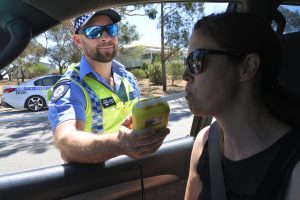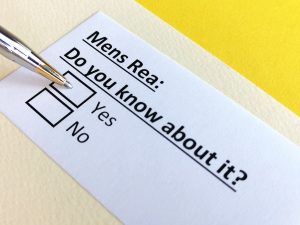 The city of Goodlettsville recently settled with a driver who was wrongfully charged with DUI (called ‘OVI’ in Ohio). The settlement was reported by a local television station which conducted an investigation into sober drivers charged with DUI. The investigation revealed the driver in Goodlettsville was one of hundreds charged with DUI and later exonerated by forensic testing.
The city of Goodlettsville recently settled with a driver who was wrongfully charged with DUI (called ‘OVI’ in Ohio). The settlement was reported by a local television station which conducted an investigation into sober drivers charged with DUI. The investigation revealed the driver in Goodlettsville was one of hundreds charged with DUI and later exonerated by forensic testing.
Articles Posted in DUI/OVI Constitutional issues
Dunlap and Chatton: Compare Apples to Apples
 The Ohio Supreme Court recently decided a case in which an officer conducted a traffic stop after learning the basis for the stop was no longer valid. The issue was whether evidence obtained from the stop was admissible in the defendant’s trial. This issue was addressed by this court in 1984. However, in the recent case, the Court reached a different conclusion.
The Ohio Supreme Court recently decided a case in which an officer conducted a traffic stop after learning the basis for the stop was no longer valid. The issue was whether evidence obtained from the stop was admissible in the defendant’s trial. This issue was addressed by this court in 1984. However, in the recent case, the Court reached a different conclusion.
Justin Timberlake’s DWI and the Presumption of Innocence
 Justin Timberlake’s arrest for DWI (called ‘OVI’ in Ohio) demonstrates the crucial need for the presumption of innocence in criminal trials. Within hours after Timberlake’s arrest, hundreds of website pages broadcasted the accusation. Many people, like the writer of this article, have already convicted him in their minds. In court, the presumption of innocence is critical due to our human nature to presume guilt.
Justin Timberlake’s arrest for DWI (called ‘OVI’ in Ohio) demonstrates the crucial need for the presumption of innocence in criminal trials. Within hours after Timberlake’s arrest, hundreds of website pages broadcasted the accusation. Many people, like the writer of this article, have already convicted him in their minds. In court, the presumption of innocence is critical due to our human nature to presume guilt.
U.S. Supreme Court Addresses Right to Confront Crime Lab Analyst
 In DUI cases (called ‘OVI’ in Ohio), a defendant’s blood or urine sample may be tested by a crime lab to determine the concentration of alcohol and/or drugs in the sample. In court, a lab analyst testifies regarding the blood or urine testing and the results of the test. But what if the analyst testifying is not the analyst who conducted the test? The recent case of Smith v. Arizona addressed whether this violates the defendant’s right to confront witnesses.
In DUI cases (called ‘OVI’ in Ohio), a defendant’s blood or urine sample may be tested by a crime lab to determine the concentration of alcohol and/or drugs in the sample. In court, a lab analyst testifies regarding the blood or urine testing and the results of the test. But what if the analyst testifying is not the analyst who conducted the test? The recent case of Smith v. Arizona addressed whether this violates the defendant’s right to confront witnesses.
Can a Driver Arrested for DUI/OVI Revoke Consent to a Blood Test?

When an officer arrests a driver for DUI (called ‘OVI’ in Ohio), the officer typically requests that the driver consent to a blood, breath, or urine test. However, a statute in the Ohio Revised Code (section 4511.191) says a driver arrested for OVI implicitly consents to those tests. Can a driver arrested for OVI revoke that consent? This question has not been directly addressed in Ohio but was recently answered by the Supreme Court of Colorado.
When Are Officers Permitted to Administer Breath Alcohol Tests?
 The Ontario Provincial Police (OPP) recently implemented a policy of administering a breath alcohol test to every driver stopped for a traffic offense. Even if the stop is for a minor violation, and even if the officer has no suspicion the driver is under the influence, the driver must submit to a breath test. Refusing the test is a criminal offense. Could this happen in Ohio?
The Ontario Provincial Police (OPP) recently implemented a policy of administering a breath alcohol test to every driver stopped for a traffic offense. Even if the stop is for a minor violation, and even if the officer has no suspicion the driver is under the influence, the driver must submit to a breath test. Refusing the test is a criminal offense. Could this happen in Ohio?
Is Lack of “Intent” a Defense to Vehicular Crimes in Ohio?
 After a domestic dispute, an Ohio woman intentionally hit a man with her car and was charged with Aggravated Vehicular Assault. According to a recent story by WHOTV7, the woman drove her SUV over a sidewalk and into a yard to hit the man. That does sound intentional. When it comes to vehicular crimes in Ohio, is intent necessary?
After a domestic dispute, an Ohio woman intentionally hit a man with her car and was charged with Aggravated Vehicular Assault. According to a recent story by WHOTV7, the woman drove her SUV over a sidewalk and into a yard to hit the man. That does sound intentional. When it comes to vehicular crimes in Ohio, is intent necessary?
Inventory Searches and DUI/OVI in Ohio
 Following a DUI arrest (called ‘OVI’ in Ohio), it is common for an officer to search the suspect’s vehicle before having the vehicle towed. This ‘inventory search’ is an exception to the general requirement of a search warrant. For an inventory search to be valid, it must be done in accordance with the policy of the law enforcement agency. A recent case decided by the Ohio Supreme Court addressed what evidence is necessary to prove the search complied with the law enforcement agency’s policy. Continue Reading
Following a DUI arrest (called ‘OVI’ in Ohio), it is common for an officer to search the suspect’s vehicle before having the vehicle towed. This ‘inventory search’ is an exception to the general requirement of a search warrant. For an inventory search to be valid, it must be done in accordance with the policy of the law enforcement agency. A recent case decided by the Ohio Supreme Court addressed what evidence is necessary to prove the search complied with the law enforcement agency’s policy. Continue Reading
Miranda Violations Lead to New Trial in DUI Murder Case
 When a suspect is in the custody of a law enforcement officer, the officer must provide Miranda warnings before questioning the suspect. If the officer does not give sufficient warnings, the suspect’s statements made in response to questioning cannot be used at trial. In a recent DUI Murder case in California, Miranda violations resulted in an appeals court ordering a new trial.
When a suspect is in the custody of a law enforcement officer, the officer must provide Miranda warnings before questioning the suspect. If the officer does not give sufficient warnings, the suspect’s statements made in response to questioning cannot be used at trial. In a recent DUI Murder case in California, Miranda violations resulted in an appeals court ordering a new trial.
Defendant’s Medical Records Cannot Be Subpoenaed for Ohio DUI/OVI Cases
 As Dominy Law Firm attorney Bryan Hawkins was preparing to litigate this issue in Franklin County, Ohio, an appeals court settled it. The issue is whether, in a DUI case (called ‘OVI’ in Ohio), a law enforcement officer can obtain the medical records of a suspect with a subpoena and without a search warrant. In the case of State v. Rogers, the Tenth District Court of Appeals held law enforcement’s procurement of an OVI suspect’s medical records without a search warrant violates the suspect’s Fourth Amendment right to be free from unreasonable searches and seizures.
As Dominy Law Firm attorney Bryan Hawkins was preparing to litigate this issue in Franklin County, Ohio, an appeals court settled it. The issue is whether, in a DUI case (called ‘OVI’ in Ohio), a law enforcement officer can obtain the medical records of a suspect with a subpoena and without a search warrant. In the case of State v. Rogers, the Tenth District Court of Appeals held law enforcement’s procurement of an OVI suspect’s medical records without a search warrant violates the suspect’s Fourth Amendment right to be free from unreasonable searches and seizures.
 Columbus OVI/DUI Attorney Blog
Columbus OVI/DUI Attorney Blog

